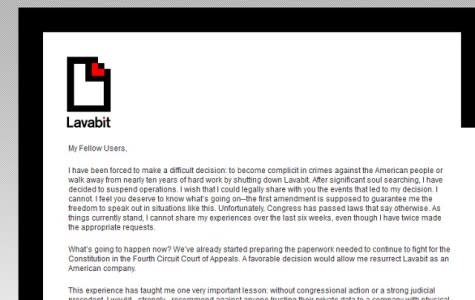The Constitution Outside the Courts: Lavabit and Silent Mail
Many Americans, not just the courts, help shape the meaning of the Constitution in the nation’s life. This series explains the actual or potential contributions of these other individuals, groups or institutions.
Lavabit’s letter to users
Today’s Constitution-makers are two online organizations that offered secure e-mail service, Lavabit and Silent Mail. Each has now shut down its service, to try to block government surveillance of their customers’ electronic messaging.
Civil disobedience is a strong tradition in America’s history – indeed, in world history — with dedicated believers in a cause refusing to bow to a government’s authority in order to protect a value or principle they hold dear. A good example was the Rev. Martin Luther King’s leading a march from Selma to Montgomery, Ala., 48 years ago, aiming to advance the cause of racial equality. Sit-ins at white-only lunch counters in the 1960s provided another example.
Such defiance of constituted power can be costly, and, indeed, has often been physically punishing. But the cost is customarily accepted as the price of remaining true to one’s cause.
Americans, having been awakened to the immense sweep of a federal government program of monitoring data about private telephone calling and e-mailing, are looking for ways to register their objection. There are increasing calls for Congress to pass new laws to rein in the National Security Agency and the FBI, and there are lawsuits seeking court-ordered restrictions on the domestic data-gathering.
Those represent efforts to establish new constitutional restraints, mainly under the Fourth Amendment and its guarantee of privacy against government intrusion. They have encountered strenuous resistance from the national government, and particularly from the intelligence community. The government is even arguing that the Fourth Amendment does not provide any protection at all for the kinds of telephone records the NSA is gathering up in massive volumes.
The private operators of communications services, potential targets of this official snooping, are routinely being ordered by a special secret federal court to hand over to the government the “business records” of their customers’ used of telephone and e-mail services. Some have tried to resist legally, by filing court challenges.
Now, however, two operators of private e-mail services – media entrepreneurs who found ways to encode their customers’ communications to try to keep them secure – have decided to close down entirely rather than have their customers’ data privacy compromised by such government searches. The two are Lavabit, whose owner hinted that his operation has already been targeted in some of the data sweeps, and Silent Mail, whose owner said that his operation has not yet been ordered to hand over anything, but who said he sees “the hand-writing on the wall.”
These are gestures of constitutional belief, stubborn assertions of the value of privacy in personal communications. Lavabit and Silent Mail have become Constitution-makers in their own right, in keeping with their vision of what the Fourth Amendment should protect, even if it does not now.
Lyle Denniston is the National Constitution Center’s adviser on constitutional literacy. He has reported on the Supreme Court for 55 years, currently covering it for SCOTUSblog, an online clearinghouse of information about the Supreme Court’s work.
Recent Constitution Daily Stories
Terry stops gone wrong? New York’s stop-and-frisk decision



